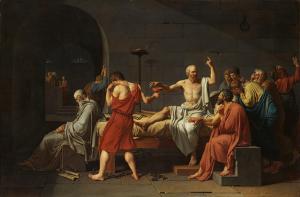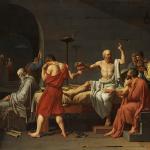
Reality may not be messy, but human understanding can be. We see partially, misunderstand mostly, debate continually, discuss endlessly, experiment constantly, examine universally.
One joy of living is wondering and discovering. The good God allows us to grow through this school for our souls. Christians live by faith with uncertain yet reasonable beliefs. Nobody can claim more than this for any philosophy or religion.
We live by faith, reasonably, passionately, hopefully.
There is joy in our disagreement as one recent commentator put it:
Well at least we’re both having fun bickering at one another. Even if I’m curious sometime if we’re even bickering about the same thing, but that another thing to worry about. And at least we can both agree upon to try and station ourselves in the real world. Too bad reality is a messy affair that no one can agree too these days, but we can least try to find it together.*
Just so.
We need not “bicker,” but can as Jesus suggests, love our enemies and discuss ideas with them. We do the best we can, give the best arguments we can, and hope to find the truth. Christianity is, best I can tell, the truth. Many disagree. Most of the world disagrees with people in “Western” countries on more than a few moral issues. Who is correct? We can only discover this through hard discourse. This is beautiful, not ugly.
As for ancient philosophers, so inconvenient to modern prejudices, the critic says:
I don’t exactly blame you for using the ancient philosopher, like Pluto or Aristotle, for due form the ancient basis of the world. I do tend to like Aristotle more then Pluto, for at least Aristotle try to tie meaning to this world. Pluto, not much like most faiths in the world, tried to prove their point by pointing to other, questionable world outside their own. I even gotten into reading summary of other philosophers of late. So far, I think I like Epicurus the most out of the bunch.
Epicurus? Please do read Epicurus, but with care.
Those that followed his advice set science back a thousand years as they embraced a wooden naturalism with no room for mathematics. Aristotle? Give him more attention and listen to his ideas. He is wrong about many things, but other big ideas have endured. What about purposefulness in biology? Is that still relevant? There is so much to examine!
Plato is key, because Plato did not abandon the “real world.” He wanted the enduring, hard reality that did not change over time. This is why Plato loved mathematics. If he had not, then the scientific revolution would have been impossible. Math works and is the language of science. He wrote a great work of philosophy of science (Timaeus) that motivated the Scientific Revolution. Ask Kepler or others who embraced Plato’s mathematical modeling.
Ask hard questions (What is truth?) and hard answers follow. I once was talking to a physicist friend and asking some questions. He pointed out that I did not even have the math needed to understand the answers! He did the best he could to explain some hard concepts to me in a language I could follow. The same is true of fields like “epistemology.” Ask hard questions about how we know what we know and the answers will soon get difficult.
It is easy to ask a big question, but harder to follow the long, difficult work needed to get the answers. That takes time which is why all of us must be patient. There is so much to learn:
Yet one thing I sure do agree with is that you really aren’t good at explaining your ideas at time. You like to throw out a lot of big terms, thoughts, and other things, and then not explaining yourself.
Like when you talk about Orthodox Christianity about it being good and all. That nice buddy, but what the hell is Orthodox Christianity, or at least your definition of it. I doubt you’re talking about actually Orthodox nor are you talking about Catholics. I’m assuming you talking about the early churches, maybe, but even those guys didn’t agree on everything. They even tried to bring all of Christianity together and try to settle it out. You can see how well that went in modern day. Hereys is far easier to create then unity.
I’ll at least take your compliment as a good thing. Thank you for that much. Keep having fun with what you like do.
Orthodox Christianity is the religion of the “eastern” part of the old Roman Empire. That is the region where Christianity was born. We are the ancient church that received the New Testament and shaped the earliest creeds. I am Orthodox, so I am, in fact, talking about the Orthodox. This is the Church.
Destroying anything good, true, and beautiful, like Orthodoxy, is far easier than creating beauty. Sacking Constantinople and appropriating the Hagia Sophia is easy, building the great church is hard. Anyone can deface a painting, few can paint. Unity always is fragile, even unity in dialogue. Hate is easy, but in the end love is stronger.
Why?
Hate kills. Love is fecund.
*Between the horrible interfaces in social media and the dreaded autocorrect, one should be charitable toward some mistakes. All of us make silly errors at times and charity forbids we just dismiss smart people for some obvious error. I hope we judge this way! I once engaged an entire thread reversing the analytic/synthetic distinction. . . something I know, but somehow blundered on for an entire thread, before I caught it. All of us should judge an error they way we would hope to be judged!












